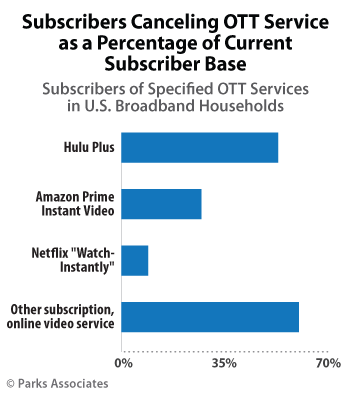High churn rates for U.S. OTT video services
Thursday, July 30th, 2015
OTT Subscriber Annual Churn Rates for Netflix, Hulu Plus, and Amazon Prime Users show consumers are testing new video services
Parks Associates’ OTT Video Market Tracker reveals high churn rates for many OTT video subscriber services. In the past 12 months, 4% of U.S. broadband households have cancelled their Netflix service, representing nearly 9% of Netflix’s current subscriber base. By comparison, 7% have cancelled their Hulu Plus subscription within the past 12 months, a figure that represents approximately one-half of Hulu Plus’s current subscriber base.

As a group, smaller OTT video services have extremely high churn rates as well. Seven percent of U.S. broadband households subscribe to an online video service other than Hulu, Amazon Instant Video, or Netflix. The number of people cancelling one or more of these services over the past year represents 60% of those who subscribe currently.
“Through the OTT Video Market Tracker service, we are tracking the details and trends of over 75 OTT video services active in the U.S. market along with another dozen or so services planning to enter the market within the next few months,” said Brett Sappington, Director, Research, Parks Associates. “The high churn rate for many of these services suggests that consumers are holding onto their Netflix account while experimenting with the wide variety of other video subscription options.”
“Consumers will go where necessary to get the video content that they want,” said Glenn Hower, Research Analyst, Parks Associates. “These video services are relatively low cost, so consumers can easily experiment with different services to find the ones that best suit their interests. At the same time, they can quickly consume the most interesting content within a service and move on.”
Currently, 85% of U.S. broadband households subscribe to a pay-TV service, and 59% of U.S. broadband households access an OTT video subscription. Of those who use OTT video, just under 50% use two or more services.
“To shed a number of subscribers equal to half or more of your current subscriber base is a huge problem,” Sappington said. “Customer acquisition costs for an OTT subscription service are relatively low, particularly compared to pay TV, but OTT video services will eventually have to capture and retain their customer bases over time in order to survive in the long term.”
Latest News
- Netflix posts first quarter 2024 results and outlook
- Graham Media Group selects Bitmovin Playback
- Dialog, Axiata Group, Bharti Airtel agree on merger in Sri Lanka
- Yahoo brings identity solutions to CTV
- Plex has largest FAST line-up with 1,112 channels
- TV3 migrates from on-prem servers to AWS Cloud with Redge